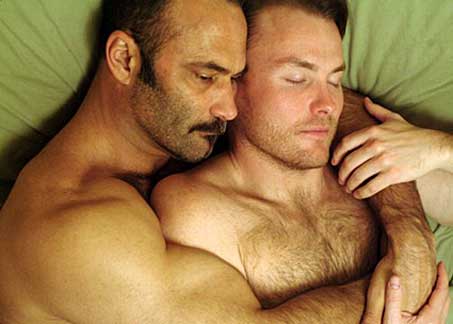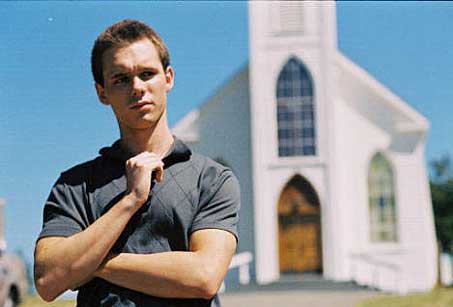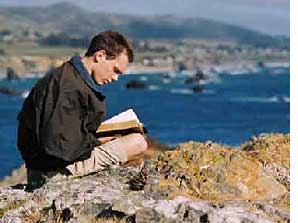
 |
||||||
|
GAY
FILM REVIEWS BY MICHAEL D. KLEMM
|
||||||
|
Coffee Date TLA
Releasing, Director/Screenplay: Starring Unrated, 94 minutes
Love Life Waterbearer Films, 2006 Director/Screenplay: Starring: Unrated, 72 minutes
Rock Haven TLA
Releasing,
Director/Screenplay Starring: Unrated, 78 minutes |
Date
Movies
I wrote in my website's bio that "though I grew up starved for queer images, I've also lived to see a time when I could actually get blase about it." I would have never believed this possible when I was in my 20s but I've reached the point where I actually feel oversaturated with gay films. Almost anyone today with a high-def video camera and Final Cut-Pro on their computer can make a movie. The prohibitive expense of distributing 35mm prints has been replaced by the DVD and web downloads. There is such a glut of them now... from coming out dramas and comedies to erotic vampire serials on Here! TV. But most of the new films disappoint. I've watched a lot this year and none of them are contending to be the next Brokeback Mountain. However, many of them have flashes of interest - even it's just provided by a hot actor. The following short reviews are films that are not great by any means but they aren't bad either. Some would make okay date movies. |
|
|
|
|
Todd overcomes his initial gay panic attack and makes friends with the guy. When they finally realize that they are each other's dates, they laugh it off, each vowing to exchange pictures next time. Then suddenly Todd asks Kelly if he wants to go to an Ingmar Bergman double feature with him - he says that he's not asking him out on a date, he would just like to see the films with him. And then Todd gets revenge on his brother and freaks him out by bringing Kelly home and taking him into his bedroom - where they both convulse with laughter after they shut the door. So far so good. The situation is contrived but it is comic and the chemistry and timing of the actors is priceless. But Coffee Date has been expanded from a short film, a festival favorite, that was just the coffeehouse blind date scene. What works as a one act short doesn't always lend itself to be expanded into a full length film. Just look at most of the movies made out of Saturday Night Live skits (It's Pat! anyone?).The material is too thin and the movie winds up being a sitcom. |
|
|
Farces usually work best when the cast is wearing 18th century frockcoats and powdered wigs while slamming doors at a fever pitch. Contemporary farces seldom work (unless the author is perhaps Joe Orton) and, unfortunately, Coffee Date turns into a so-so episode of Will and Grace or Friends expanded to feature length. One third act "surprise" is just too ludicrous to be believable. But there are charms along the way and a likable cast. Wilson Cruz gets top billing and his is the standout performance. He looks great too. Jonathan Bray as Todd comes across as a studlier version of Will Farrell. Their scenes together elevate the film. Sally Kirkland
also appears in:
|
|
 |
|
|
Love Life is an interesting film that explores a marriage of convenience, opening with an interviewer asking Joe (Stephen T. Gill) and Mary (Stephanie Kirchen) what a typical day of their married life is like. Here's the rub: Mary is a bisexual woman who got married just to please her mother so that she wouldn't be cut her off from the family money. Joe is a former pro athlete who coaches at the local college. He is gay - and in the closet big time - and Mary is the perfect beard to help project the proper image at the university. The money is good too. It's a situation advantageous to both. There is also an agreement that each is free to have sex partners on the side. |
|
|
|
|
|
This one is a rarity; it can appeal to both the guys and the ladies. Actually, one of the nice things about this movie is the way it cuts the two love scenes together - one between two men and one between two women - providing a nice contrast and rhythm. |
|
|
Love Life is only 72 minutes long so it's not too big of a chunk of your life that you won't get back. Even though it screams "first year film student," the story is a pretty good one and it was nice to see a film that equally features both gay men and women for a change.
More On Damion Dietz:
|
|
 |
|
|
On the other hand, Rock Haven is a Lifetime TV movie (except for one full frontal shot). This one is the classic opposites attract romance. Brady is 18 and devoted to serving the Lord. He and his mother have just moved to a seaside community. When we first see him, he is sitting on the beach, reading the Bible. One day, he stops dead in his tracks when he sees Clifford, 19, standing on the beach and slowly and sensuously pulling off his shirt. When Clifford sees him and smiles, Brady runs away in terror. Later, as Brady showers, he rubs his body while thinking about the boy on the beach. We all know where this one is going, don't we? Brady is, of course, deeply in the closet and is fighting to suppress his urges. It doesn't help that his mother - who looks like Wendie Mallick with her hair in a bun - is about to open a Bible School. Their house is sparsely decorated, like a monastery, and the worst copy of Da Vinci's The Last Supper that I have ever seen is hanging in their dining room. Brady's mother, sensing that something is wrong, tries to fix him up with a nice Christian girl - who knows immediately that he's queer because he isn't staring down her dress. Brady, though fighting his "sinful" desires, is drawn to Clifford who is doing everything in his power to pull Brady out of the closet. It is worth noting that Clifford respects Brady's faith (or is at least humoring him) and takes an interest in the Bible. Of course their friendship eventually turns into love but, as soon as they go all the way, Brady's Christian panic clicks in. Will Brady be able to reconcile the two raging storms inside him? |
|
 On
the plus side, Brady and Clifford's love scenes together are sweet and sexy
- especially a very long uninterrupted camera take of the two boys kissing.
The scene where they initially bond over junk food is cute (Clifford's mother
is an aging hippie/Wiccan whose idea of junk food is a granola bar - oh,
and to contrast with Brady's home life, she is, of course, a free spirit
who encourages her son's love life.) On
the plus side, Brady and Clifford's love scenes together are sweet and sexy
- especially a very long uninterrupted camera take of the two boys kissing.
The scene where they initially bond over junk food is cute (Clifford's mother
is an aging hippie/Wiccan whose idea of junk food is a granola bar - oh,
and to contrast with Brady's home life, she is, of course, a free spirit
who encourages her son's love life.)
On the minus side, we've seen this story before many times and the movie moves at a snail's pace. Almost every time something starts to happen, the scene will dissolve to images of surf, rocky cliffs, or wind blowing through the fields until you want to scream. (The boring music cues accompanying these overdone scene transitions only adds to the annoyance factor.) This approach might work in Terrence Mallick's films but it stops this movie dead every time. I received no press on this film, and pickings online are scarce as well, so I am going to assume that writer/director David Lewis once had to reconcile his sexuality with his spirituality and that this script is somewhat based on his experience. To his credit, Rock Haven is not preachy but it needs to further explore its main theme. As is, there is too much shorthand. A little less scenery and more character development would have helped. Both of the mothers are one-dimensional types and the priest at the church seems a tad liberal considering how pious his parishioner, Brady's mom, is. |
|
|
There are a few deleted scenes on the DVD. Two of them would have added a bit more character richness had they been left in the film. Next time a few less pastoral screen transitions, okay? Thank God there weren't any incidental songs too. As I said when I began this installment, none of these films are bad. Each has their charms. I just don't expect to see them cited in any film school texts any time soon.
More on David
Lewis:
|